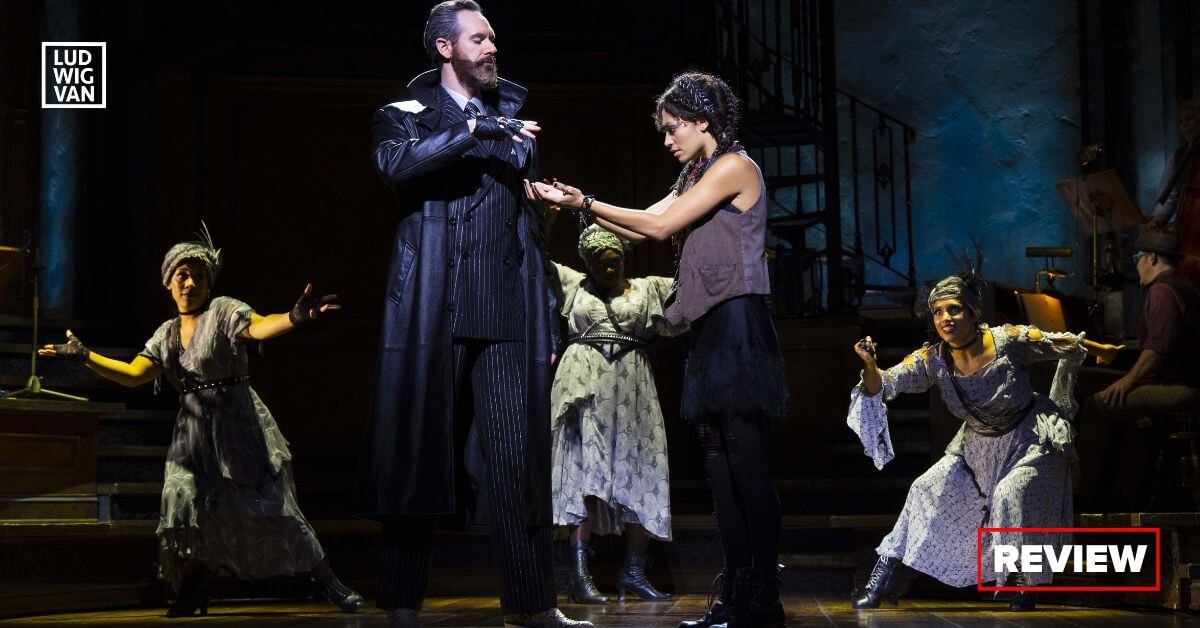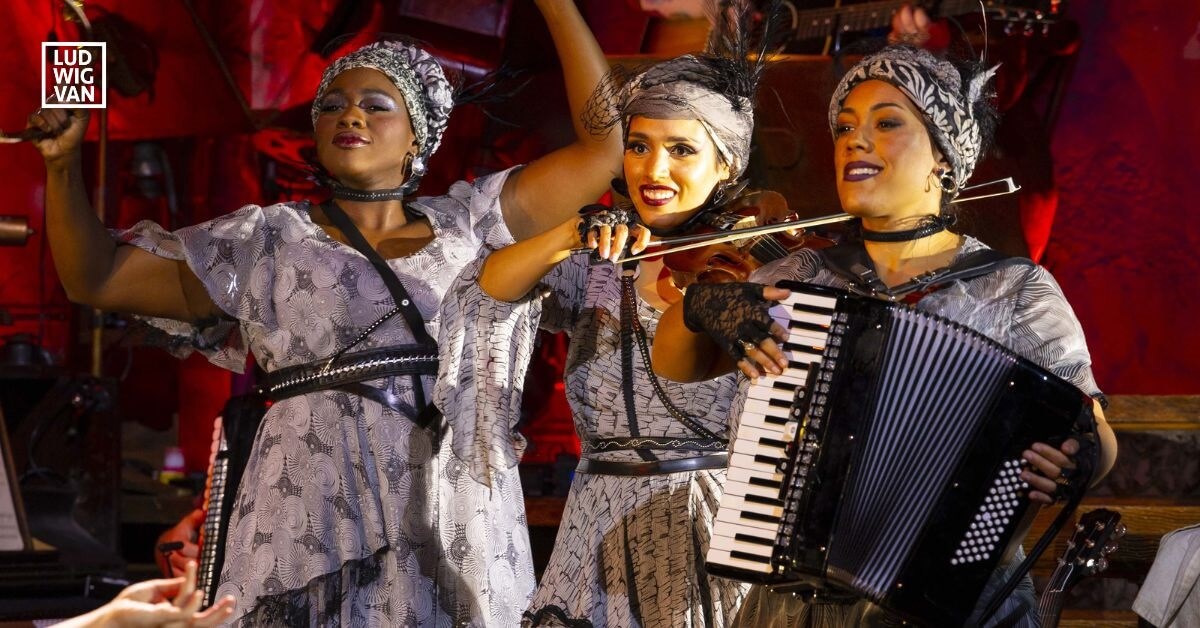
David Mirvish /Hadestown, music, lyrics and book by Anaïs Mitchell, directed by Rachel Chavkin, Royal Alexandra Theatre, July 5 to August 20. Tickets here.
Hadestown is a genuine hit. It won the 2019 Tony Award for best musical, and is still playing on Broadway. In fact, it is the longest running production in the history of the Walter Kerr Theatre. The original Broadway cast recording garnered the Grammy Award for show album and continues to be the most streamed musical this year. Clearly, Hadestown has become a part of popular culture.
If, however, you feel a “but” coming on, here it is. The first act of Hadestown is absolutely mundane, leaving me wondering what all the shouting was about. Nonetheless, the show is redeemed by a second act that becomes electrifying when Hades (Matthew Patrick Quinn) takes centre stage.
Hadestown is a phenomenon because one woman, singer-songwriter Anaïs Mitchell, wrote the music, lyrics and book, and won a Tony for best original score for her effort. She is only the fourth single woman to write all three components in the history of Broadway.
The show is also singular for the extraordinarily long journey it took to get to Broadway.
Mitchell is from Vermont, and in 2006, with fellow Vermonter man of theatre, Ben t. Matchstick, she conceived a show based on the Orpheus/Eurydice myth that toured throughout the state in 2006/7. (To find Matchstick’s credit as co-conceiver, you have to go to the tiny writing at the bottom of the credit page in the program.) In 2010, Mitchell turned the show into a concept album, which led to concert performances worldwide.
With an eye on Broadway, in 2013, Mitchell began to work with seasoned director Rachel Chavkin that beefed up the material through a series of workshops, and in 2016, Hadestown made its off-Broadway debut, in the round, at New York Theatre Workshop, winning a slew of Obie Awards. A dramaturg called Ken Cerniglia is also given program credit.
The Canadian connection happened in 2017 at Edmonton’s Citadel Theatre, where the production was converted to a proscenium stage, followed by a run at London’s National Theatre in 2018. By the time Hadestown reached the Walter Kerr Theatre, three countries later, it had doubled in length to two acts, with the concept album’s 20 songs now increased to 35.
Which brings us to the present production, which Mitchell calls a folk opera.
To Mitchell and Matchstick, the Orpheus/Eurydice myth is one of nature versus industry, freedom versus fascism, artist versus capitalist, art versus money, faith versus fear, and hope versus oppression. The duo deliberately set the scene in a Depression-like era so that there could be a sociopolitical/postapocalyptic theme running alongside the two love stories (Orpheus and Eurydice, and Hades and Persephone).
Hadestown is a bleak factory manned by workers numbed by routine, although Hades, the dictator, calls it freedom. When Hades’ wife Persephone (Maria-Christina Oliveras) spends her allotted six months in Hades, fall and winter deaden the world above. In the other six months, Persephone brings spring and summer, when she is allowed to leave Hades to visit her mother.

Orpheus (J. Antonio Rodriguez) is an artist-dreamer, hoping to write an epic song that will bring glorious awakening to both Hades and earth — that will change the world. He falls in love with the vagabond Eurydice (Hannah Whitley), a girl who has seen only hard times, and who is lured away to Hadestown by Hades and the promise of security and never being hungry again. When Orpheus gets permission to bring Eurydice back, he, as the myth goes, breaks the rules by turning back to see if she is following, and he loses her forever.
There is also the central character of the messenger Hermes (Will Mann), who narrates the story, and the three Fates (Belen Moyano, Nyla Watson and KC Dela Cruz), whose main goal is to plant seeds of doubt while giving bad advice. A chorus of workers rounds out the cast.
As Hades, Quinn has such resonate low notes that he is a basso profundo on steroids, He also has a magnetic personality that commands the stage. Oliveras as Persephone is all sass, with a real canbelto voice. Rodriguez’ Orpheus is designed to sing in falsetto, which is not to all tastes, while Whitley as Eurydice has the break, catch, sob — whatever you want to call it — in her voice that I find particularly annoying. Mann’s Hermes has just the right touch of sly irony, while The Fates produce great harmony. They also play instruments (accordion, violin and triangle).
As for the music, it is melodious, but also up and down singspiel, which I didn’t find particularly interesting. It would seem that traditional folk music, spirituals and New Orleans jazz are the dominant features. There are a few songs that capture the ear, like Road to Hell and Hey, Little Songbird, but Orpheus’ great theme, Epic, is not particularly arresting.
There is a curious irony, however. Hades’ first act closer, Why We Build the Wall, predates Trump’s presidency, but of course has taken on a new meaning. In the show, the wall is to keep out the enemy, which is poverty (read migrants in the Trump era).
In mystifying fashion, designer Rachel Hauck won a Tony for set design. Her concept is a bank of bleachers to house the onstage band, with a balcony for Hades and Persephone on top, and an opening for hell below. This leaves a postage-size area for action. Presumably, director Chavkin won her Tony for manoeuvring the actors through and around this tiny stage. Bradley King’s Tony Award-winning lighting is awesome, however.
Mercifully, David Neumann did not win a Tony for choreography, although he was nominated, because only the workers’ robotic circling that he created has any merit. When one thinks about what a great dancesmith could have done with the dance for Hades and Persephone when they renew their love, the ridiculous, amateur movement that stands for this reconciliation is an artistic crime.
In the final analysis, I concede that sometimes popular culture and myself are across a great divide. Although Quinn’s performance as Hades saved the second act for me, I’m afraid Hadestown left me wanting more.
#LUDWIGVAN
Get the daily arts news straight to your inbox.
Sign up for the Ludwig van Daily — classical music and opera in five minutes or less HERE.
- INTERVIEW | Actor Diego Matamoros Takes On Icon Walt Disney In Soulpepper Production Of Hnath Play - April 16, 2024
- SCRUTINY | Opera In Concert Shine A Light On Verdi’s Seldom Heard La Battaglia Di Legnano - April 9, 2024
- SCRUTINY | Lepage & Côté’s Hamlet Dazzles With Dance And Stagecraft Without Saying Anything New - April 5, 2024



